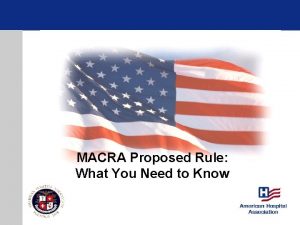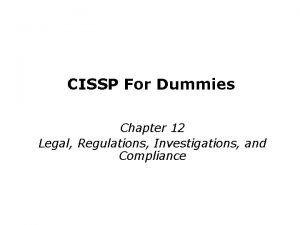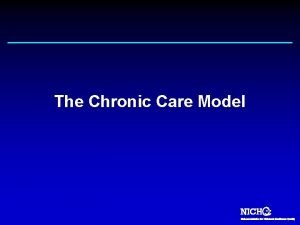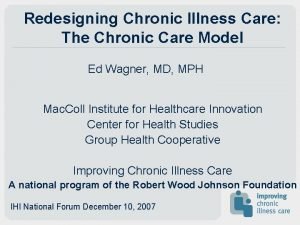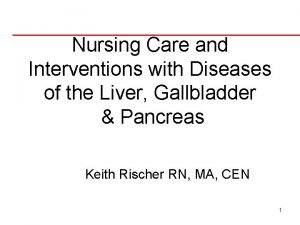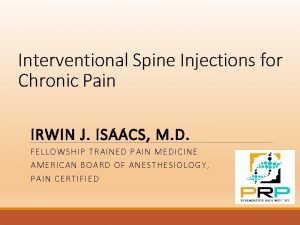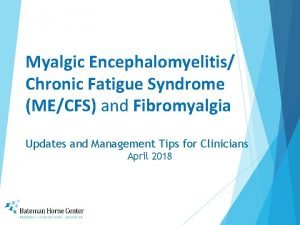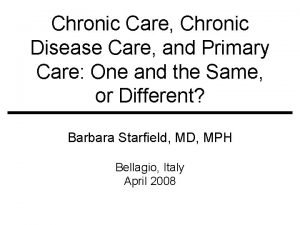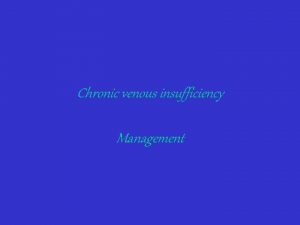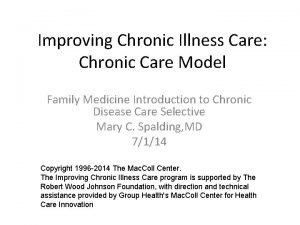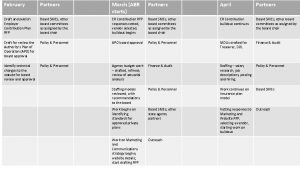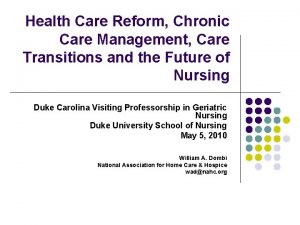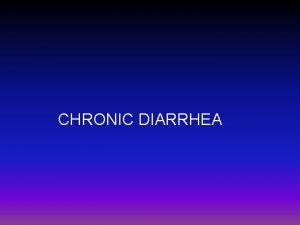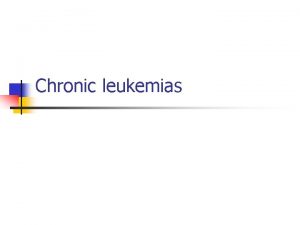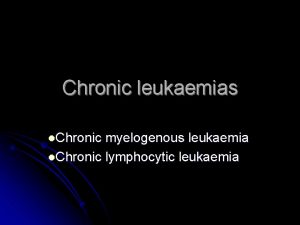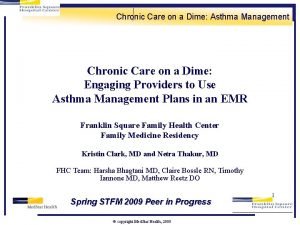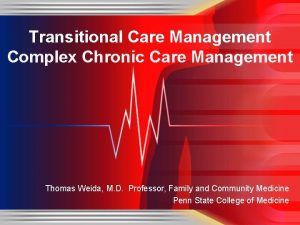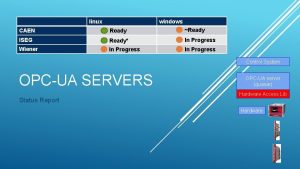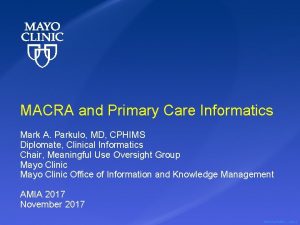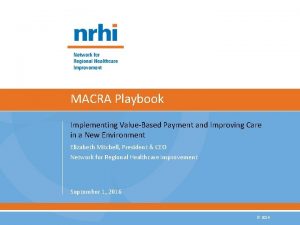MACRA Chronic Care Management Are You Ready Partners










































- Slides: 42

MACRA & Chronic Care Management: Are You Ready? Partners in Patient Care

PRESENTERS: DR. KIM KUEBLER, DNP, APRN, ANPBC Founder and Director of Multiple Chronic Conditions Resource Center, editor and author of multiple peer review papers and 8 textbooks on symptomatic chronic conditions. She is a researcher, educator and clinical provider. Kuebler holds several federal appointments to include Medicare Evidence Development & Coverage Advisory Committee

PRESENTERS Van Willis Co-Founder & CEO PREMEDEX is a leader in healthcare transformation and combines data analytics with advanced communication services in order to increase efficiencies, improve patient satisfaction, and positively influence the related outcomes of your patient population Preston Rodenbaugh Business development leader and advisor for healthcare transformation. Assist’s providers with extending value based care for Chronic Care Management and Transitional Care

OBJECTIVES • Discuss current trends in the Medicare patient population diagnosed with multiple chronic conditions • Review the Medicare reimbursement incentives for chronic care management

OBJECTIVES • Describe how to implement and obtain monthly reimbursement incentives that demonstrate 24/7 patient and family support • Learn how chronic care management can address the requirements for MACRA outcomes and future incentives.

AGING DEMOGRAPHICS The US is in the midst of a major demographic shift, In the next four decades, people aged 65 and older will make up the largest percentage of the population Centers for Disease Control and Prevention (CDC), 2015

AGING WORLD, 2016 The oldest segment of the world’s population is growing faster than the younger segment Worldwide, the population of people aged 80 and over is projected to more than triple between 2015 and 2050, from 126. 5 million to 446. 6 million He, W. , Goodkind, D. , & Kowal, P. (2016). An Aging World 2015: International Population Reports. US Department of Commerce

Aging World 2015 International Population Reports Between 1980 to 2010, US census data showed 90 and older population almost tripled when compared to a doubling of the population aged 65 to 89 Centenarians or people older than 100, increased by 65. 8 percent in the US during the same period of time He, W. , Goodkind, D. , & Kowal, P. (2016). An Aging World 2015: International Population Reports. US Department of Commerce

Aging World

Medicare Demographics

POPULATION CHANGES IN 2010, 70% OF THE AMERICAN POPULATION HAD MORE THAN ONE CHRONIC CONDITION – IN 2012 THIS INCREASED TO 75% - AND CONTINUES TO ESCALATE Centers for Medicare & Medicaid Services, 2012

MEDICARE BENEFICARIES • Currently, one in 4 Americans have MCC’s • Two out of three Medicare beneficiaries have MCC. US Dept. of Health & Human Services, 2016

MEDICARE BENEFICIARIES • People with MCC are at increased risk for morbidity and poor physical functioning • MCC account for substantial health care costs in the

MEDICARE BENEFICARIES 93% of Medicare Fee For Service is spent on patients with Multiple Chronic Conditions Centers for Medicare and Medicaid, 2016

Source: Centers for Medicare and Medicaid Services. Chronic Conditions among Medicare Beneficiaries, Chart book: 2012 Edition Baltimore, MD. 2012.

Source: Centers for Medicare and Medicaid Services. Chronic Conditions among Medicare Beneficiaries, Chart book: 2012 Edition Baltimore, MD. 2012.

MACRA LEGISLATION VALUE BASED April 27 th, 2016 executive notice by the US Department of Health and Human Services issued key provisions to the Medicare Access and Summary CHIP Reauthorization Act of 2015, (MACRA). Bi-partisan legislation MACRA replaced the 1997 Sustainable Growth Rate formula for determining Medicare reimbursement MACRA provides a new approach in Medicare reimbursement based on value and quality care

MACRA LEGISLATION VALUE BASED MACRA legislation is guided by CMS Quality Payment Program and directs two paths for Medicare reimbursement – beginning January 1, 2017 The Merit-based Incentive Payment System (MIPS), or the Advanced Alternative Payment Model (APM), CMS predicts 88% of providers (physicians, nurse practitioners, physician assistants and certified nurse anesthetists) will be MIPS vs APM

MACRA LEGISLATION MIPPS, will replace the current Medicare measures used to determine quality and value: • The Physicians Quality Reporting System (PQRS), • Value Modifier Program (VM) and the; • Medicare Electronic Health Record (EHR) Incentive Program’s or Meaningful Use will be grouped together under MIPPS US Department of Health and Human Services, 2016

MACRA LEGISLATION MIPPS ensures Medicare provider care is incentivized for quality, safe and efficient care through 4 categories: Quality Performance Replaces PQRS and VM, and responsible for 50% weight in the first year. Emphasis is on outcome measurements (6 measures in the certified CMS meaningful use EHR) Centers for Medicare and Medicaid, 2016

MACRA LEGISLATION MIPPS Advancing Care Information Category supports the use of patient engagement, medication safety, patient access to EHR etc. , Accounts for 25% of weight in the first year. The weight of this category may decrease as more providers and practices adopt EHR use. Centers for Medicare and Medicaid Services, 2016

MACRA LEGISLATION MIPPS Clinical Practice Improvement Providers can select from over 90 proposed activities such as self-management, shared decision making, care coordination, patient safety checklists etc. This category accounts for 15% weight in the first year Centers for Medicare and Medicaid Services, 2016

MACRA LEGISLATION MIPPS Resource Use CMS calculates the weight of this category based upon claims data and accounts for 10% in the first year. This category replaces the VM. Centers for Medicare and Medicaid Services, 2016

CMS: CHRONIC CARE MANAGEMENT (CCM) CCM USE HITS 33 MEASURES UNDER QUALITY AND, 22 HIGH PRIORITY MEASURES: • FULFILLS CLINICAL PRACTICE IMPROVEMENT • ADDRESSES COST RESOURCE USE • ADVANCING CARE INFORMATION – THROUGH EHR

MEDICARE NON-FACETO-FACE ENCOUNTER • January 2015, CMS finalized separate payment for Chronic Care Management (CCM) services for nonface-to-face care • Payment for CCM CPT Code - 99490 • Average reimbursement for CCM services is $42. 60/ monthly. Regional dependent Federal Register, 2014

CCM - CPT 99490 REQUIREMENTS • Patients must have two or more chronic conditions extending a year or more, or until the death of the patient • Chronic Care Management (CCM) services, requires at least 20 minutes of clinical staff time directed by a qualified health care professional, per calendar month Centers for Medicare and Medicaid Services, 2015

CCM REIMBURSEMENT REQUIREMENTS • Access to care management services, 24 hours a day, 7 days a week • Develop and implement an individualized patient-centered care plan • Provide coordination and transitions in care between settings

CCM REIMBURSEMENT REQUIREMENTS • Provide coordination with home & community-based clinical service providers • Promote and provide communication between provider, patient and caregiver • Populate the Electronic Health Record with important patient data and sharing of care plan information

CCM -MEDICARE BENEFICIARY AGREEMENT • Inform patient on CCM services and obtain written agreement for services • One provider a month can provide CCM services • Can withdraw from services at anytime • Explain coinsurance and deductibles • Enrollment in CCM is documented in the EHR

MONTHLY CALL • Provide Consistent Care Coordination to establish relationship and familiarly with individual patient • Establish, review and modify patient-centered care plan – embedded in the EHR Physical functioning, Cognitive Assessment, Social Determinants, Caregiver Support, Disease Exacerbations Medication Adherence, Review Medical Management • PREMEDIX, use of practice phone numbers when making monthly calls

PRACTICE PROCESS

CCM BENEFITS: THE PATIENT For Patients • Access to primary care provider 24/7 • Monthly communication and review of health status • Ensure medication adherence and monitoring • Communicate changes in health status directly with the medical provider • Provides access to medical record and provides shared decision making between patient and provider • Provides a dynamic care plan that is up-to-date and relevant to patient condition

CCM BENEFITS: THE PROVIDER For Providers • Promotes coordinated and comprehensive care • Individualizes patient-centered care plans • Reduces crisis-like care through ongoing communication and proactive disease management • Promotes coordinated and comprehensive care outside of the clinical setting • Provides patient satisfaction for 24/7 availability and prompt follow-up • Increases monthly reimbursement incentives

POLL QUESTIONARE Do you currently utilize CCM incentive reimbursement in your practice setting? a) Yes b) No c) Not yet, but we plan to in the next 1 -2 years d) Not sure

OUTSOURCING CCM CMS allows for outsourcing and reduces the need for: • Staff training and time away from practice demands • Billing and reimbursement coding and expertise • Employing designated care coordinators • Budgeting for specialized staff and technology to meet the requirements of CCM • Inability to manage an unpredictable variation in patient volume • Monitoring patient-centered outcome measures CONFIDENTIAL

OUTSOURCING CCM WHAT ARE YOU WAITING FOR? CCM IS 20 MONTHS INTO THE MAKING IMPROVE CARE COORDINATION AND REDUCE DEBILITY, DISEASE EXACERBATION AND HOSPITAL ADMISSION

CCM INCENTIVE REIMBURSEMENT REVENUE Chronic Care Management Services • ~$42. 60 per patient per month Annual Wellness Visit Optimization • $172. 00 Initial Visit • $111. 00 Subsequent Visit Estimated 80% of 50 Million Eligible Beneficiaries are not Taking Advantage of the Benefit Centers for Medicare and Medicaid Services, 2016

INCENTIVE EXAMPLE • Average # of Medicare Patients/Provider (2 MDs) • Total # of Medicare Patients • % Eligible (2> conditions) • Eligible Medicare Patients • Target Enrollment % • Monthly # of Patients • CCM Reimbursement • Annual Revenue • Annual Cost • One Year Net-Gain 800 1, 600 70% 1, 120 40% 450 $42. 60 $230, 040 $129, 600 56. 34% $100, 400

2016 CMS CURRENT RULES FOR CCM • • CMS currently reimburses CCM codes (99487 & 99489) and addresses “complex” care needs 99487: 60 minutes of clinical staff by required providers per calendar month 99489: Additional 30 minutes of clinical staff time per calendar month Initiating visit required for new patients or patients not seen within one calendar year Centers for Medicare and Medicaid Services, 2016

2017 CMS PROPOSED RULES FOR CCM • • • Removing the requirement for 24/7 access to care plan by CCM providers No longer required to standardize content for continuity of care document Beneficiary consent can be obtained without a written agreement New “add-on G-code” to add payments for provider led care planning General supervision allowed for rural health clinics and FQHCs Federal Registrar, 2016

POLL QUESTION How prepared are you to engage your patients in CCM? a) Totally prepared, workflows are in place b) Somewhat prepared, need to train c) Not prepared d) Not sure

Thank you! www. multiplechronicconditions. org www. premedex. com
 Mikael ferm
Mikael ferm Stay ready to keep from getting ready
Stay ready to keep from getting ready Macra proposed rule
Macra proposed rule Macra for dummies
Macra for dummies Macra plastic surgeon
Macra plastic surgeon Flinders model of care
Flinders model of care They are not ready question tag)
They are not ready question tag) Wagner's chronic care model
Wagner's chronic care model Chronic care model definition
Chronic care model definition Chronic care solutions
Chronic care solutions Chronic care
Chronic care Nursing care plan for acute pancreatitis
Nursing care plan for acute pancreatitis Improving chronic illness care model
Improving chronic illness care model Wagner chronic care model 1998
Wagner chronic care model 1998 Chronic care solutions
Chronic care solutions Primary care secondary care tertiary care
Primary care secondary care tertiary care Equal partners in care
Equal partners in care Kate lorig stanford
Kate lorig stanford Stage 3 liver cirrhosis
Stage 3 liver cirrhosis Nursing diagnosis pancreatitis
Nursing diagnosis pancreatitis Cervical facet referral patterns
Cervical facet referral patterns Security management partners
Security management partners Are you ready let's go
Are you ready let's go Are you ready for today's lesson
Are you ready for today's lesson Are you ready to be a parent
Are you ready to be a parent Are you ready for calculus answers with work
Are you ready for calculus answers with work Jesus is coming soon are you ready
Jesus is coming soon are you ready Are you ready for the lesson
Are you ready for the lesson 3 2 1 are you ready
3 2 1 are you ready The more you care the stronger you can be
The more you care the stronger you can be Do you love the rain
Do you love the rain Eat meals that are nutritious agree or disagree
Eat meals that are nutritious agree or disagree If you think you can you can poem
If you think you can you can poem Tell me what you eat and i shall tell you what you are
Tell me what you eat and i shall tell you what you are I will always follow you whenever and wherever you go i am
I will always follow you whenever and wherever you go i am Chronic blood loss
Chronic blood loss Definition of chronic toxicity
Definition of chronic toxicity Earthy look in chronic renal failure
Earthy look in chronic renal failure Chronic granulomatous disease
Chronic granulomatous disease Pulp pathosis
Pulp pathosis Types of anemia ppt
Types of anemia ppt Pathogenesis of cholecystitis
Pathogenesis of cholecystitis Myalgic encephalomyelitis
Myalgic encephalomyelitis


